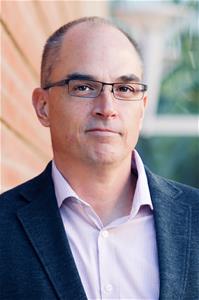Jun 9, 2021
Disruption marches on through skunk works at Gies
Projects ranging from robotic process automation to prediction models powered by artificial intelligence have flourished since the official launch of the Disruption Lab at Gies College of Business in January. The Lab has garnered participation from some 60 students from 28 disciplines spanning the campus, six faculty and staff members, and a handful of interested foundational partners from outside the University.
With those early successes in hand, Dr. Robert Brunner, director of the Disruption Lab, is leveraging the momentum and setting his sights on launching a new phase of the fledgling Lab’s ambitious agenda: a skunkworks operation that will bring together collaborators from inside and outside the university to develop projects with practical application for Gies, the larger University, and partners in the business world.
 “We’ve made strong progress since January,” said Brunner (left), who also serves as Associate Dean for Innovation and Chief Disruption Officer for Gies Business. “We’ve launched student-led projects and recruited mentors from the faculty, staff, and outside companies. We’re getting some recognition and gaining some traction. We are now taking the next step toward longer-term projects developing concrete solutions to real business problems.”
“We’ve made strong progress since January,” said Brunner (left), who also serves as Associate Dean for Innovation and Chief Disruption Officer for Gies Business. “We’ve launched student-led projects and recruited mentors from the faculty, staff, and outside companies. We’re getting some recognition and gaining some traction. We are now taking the next step toward longer-term projects developing concrete solutions to real business problems.”
Gies announced the launch of its Disruption Lab in January 2021. It's an effort to prepare students and corporate partners to succeed in a business world being rapidly reshaped by unprecedented technological innovation and social pressures. Ernst & Young LLP (EY US) has agreed to support the lab as a founding corporate member. EY has been a longtime collaborator for the college and has successfully hired many Gies students into fulfilling careers.
While Brunner is never short of ideas, he’s also a realist. The first months of student-led projects, while exciting, also exposed the limitations of working within a 14-week semester.
“We discovered that by the end of semester students were delivering prototypes. But we believe there is a real need to provide actual products – products that have been tested, re-considered, and improved based on actual application,” he said.
He envisions, for example, the development of a mobile app for students, utilizing the Rokwire open source mobile ecosystem developed by Smart, Healthy Communities, an interdisciplinary initiative based at UI. Among the first Rokwire applications was campus-wide test-tracking and notification for COVID-19, and Brunner and his colleagues believe that the platform offers a myriad of powerful applications for other uses.
“The key to the technology is that it authenticates each user, which opens the door to a wide array of customized applications,” he said, reeling off potential projects such as virtual advising and other academic support services for students; augmented reality avatars that provide interview coaching for job-seeking students and alumni; workforce development for University faculty and staff; and student recruitment marketing.
“But it will take time, and that’s where the skunk works model can really be an asset.”
Brunner envisions bringing in a director – a faculty or staff member, or a partner from the business community – someone who could ensure continuity for projects that extend a year or longer. The director, he says, would establish key performance indicators, stay on top of immersive technologies (existing and emerging), keep abreast of needs and opportunities, and conduct continuous impact assessment of the products throughout the development lifecycle and launch.
Brunner’s enthusiasm is contagious, and one has the feeling that he’s always several steps ahead when it comes to thinking about disruption.
“You know, Gies began using Zoom about six years ago with its online graduate program, when that platform was in its infancy and nobody paid much attention,” he said. “And in the past year everyone in higher ed has adopted it. We have a long history of disruptive innovation; it's part of our DNA, part of our mission. But when the target is to be the most innovative business school in the world you can’t just sit still.
“What we want to do here is all about future-proofing, giving both Gies College and our students the opportunity to develop the skills and agility to see and define the path ahead, determine what needs to be done to stay relevant, and help others manage complexity and rapid change.”
